Affiliate links on Android Authority may earn us a commission. Learn more.
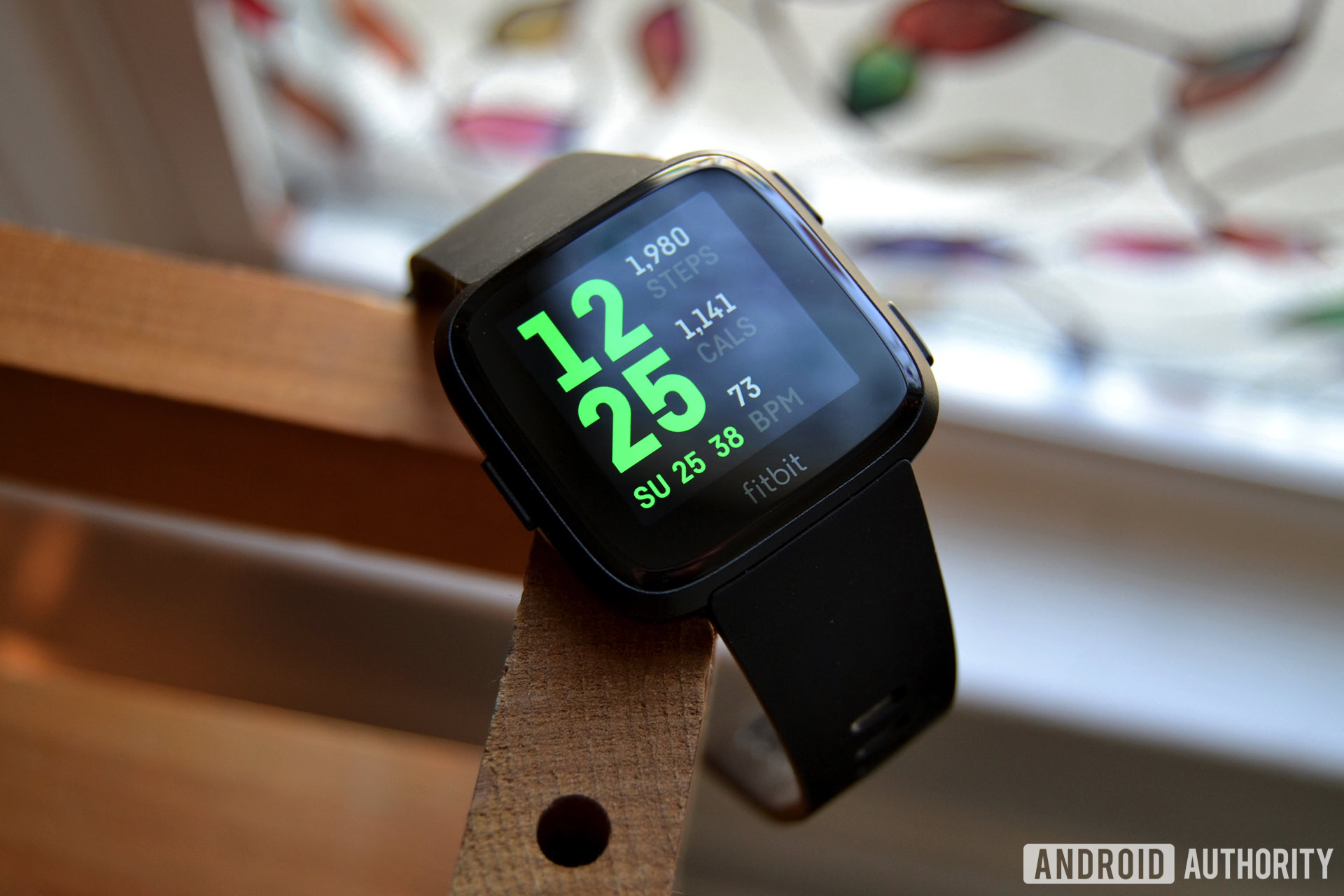
Fitbit Versa review: Just buy one already
Published onMarch 4, 2020
Fitbit Versa
What we like
What we don't like
Fitbit Versa
Update: March 11, 2020: We have updated our Fitbit Versa review to reflect new software updates. Check out all the details below!
Also, keep in mind that the Fitbit Versa 2 is now available. If you want an upgraded display and Amazon Alexa support but want a similar experience to the original Versa, consider upgrading to the newer model.
If you were disappointed by Fitbit’s first smartwatch offering, you aren’t alone. Many had high expectations for the Ionic, but it was too expensive and bulky to appeal to a wide audience. Fitbit knows this, and launched yet another smartwatch — the Fitbit Versa — earlier in March 2018.
The Versa is cheaper and better looking than the Ionic, and it comes with some much needed software improvements. But Fitbit is still relatively new to the smartwatch space. Can it compete with more seasoned veterans like the Apple Watch or Wear OS? We think so, but only in some areas.
Design
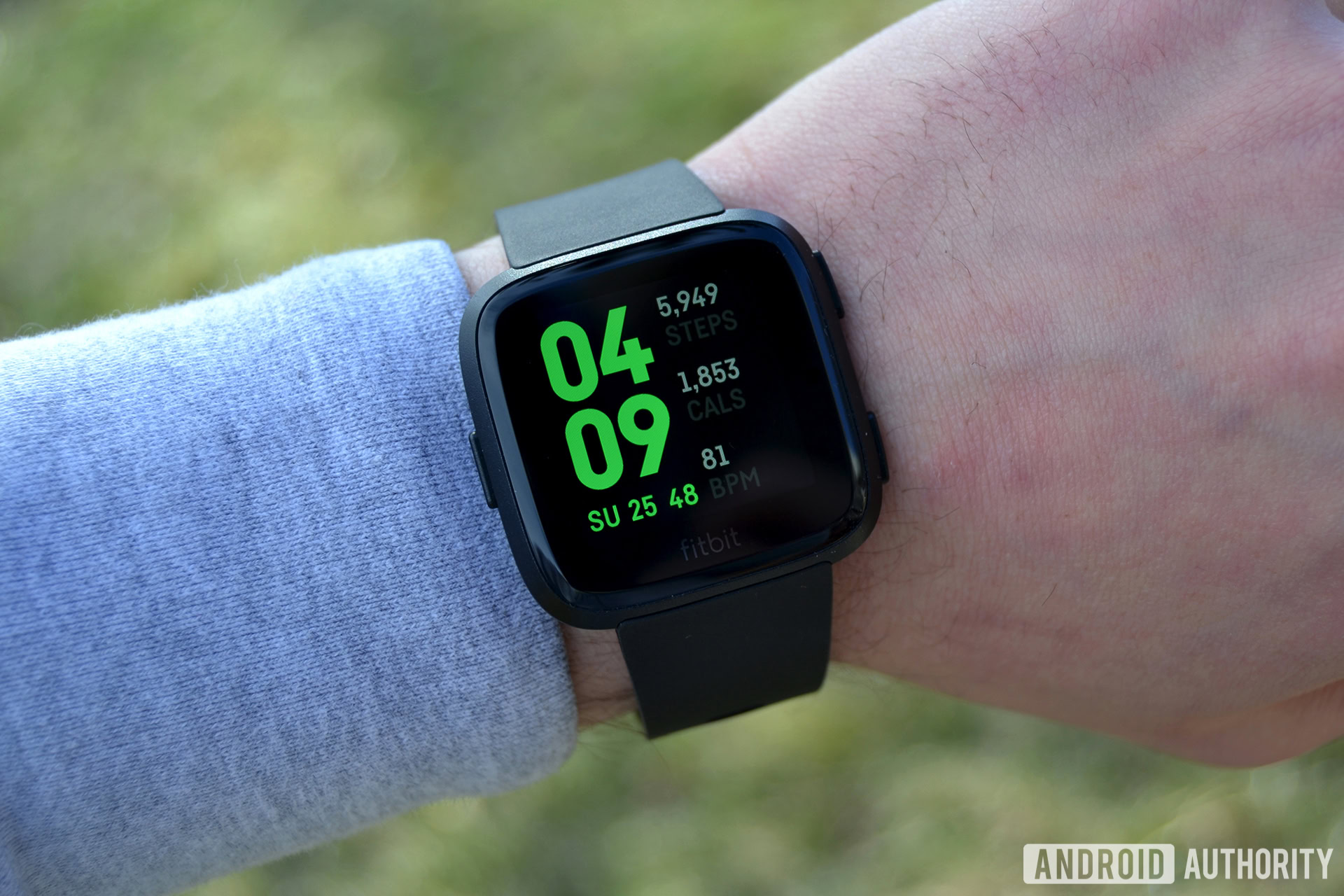
The Fitbit Versa looks nothing like the Ionic, and that’s great. It has a much more approachable, compact design, and actually looks more like the Apple Watch. Call it an Apple Watch Lite.
The Versa is way more comfortable than the Ionic.
It’s thin — measuring just 11.2mm — and Fitbit says it’s also the lightest metal smartwatch in the U.S.. This is one of the most comfortable smartwatches I’ve worn in recent years, likely due to the improved design and high-quality materials of the case and strap. It feels like Fitbit used a lot of Pebble’s design language here, which was notably lacking from the Ionic. The chamfered edges surrounding the squircle watch case makes for a fun, premium aesthetic we think a lot of people will like.
It also passes the wife test. The Ionic was too bulky and uncomfortable for my wife to wear, but she has no problem with the Versa.
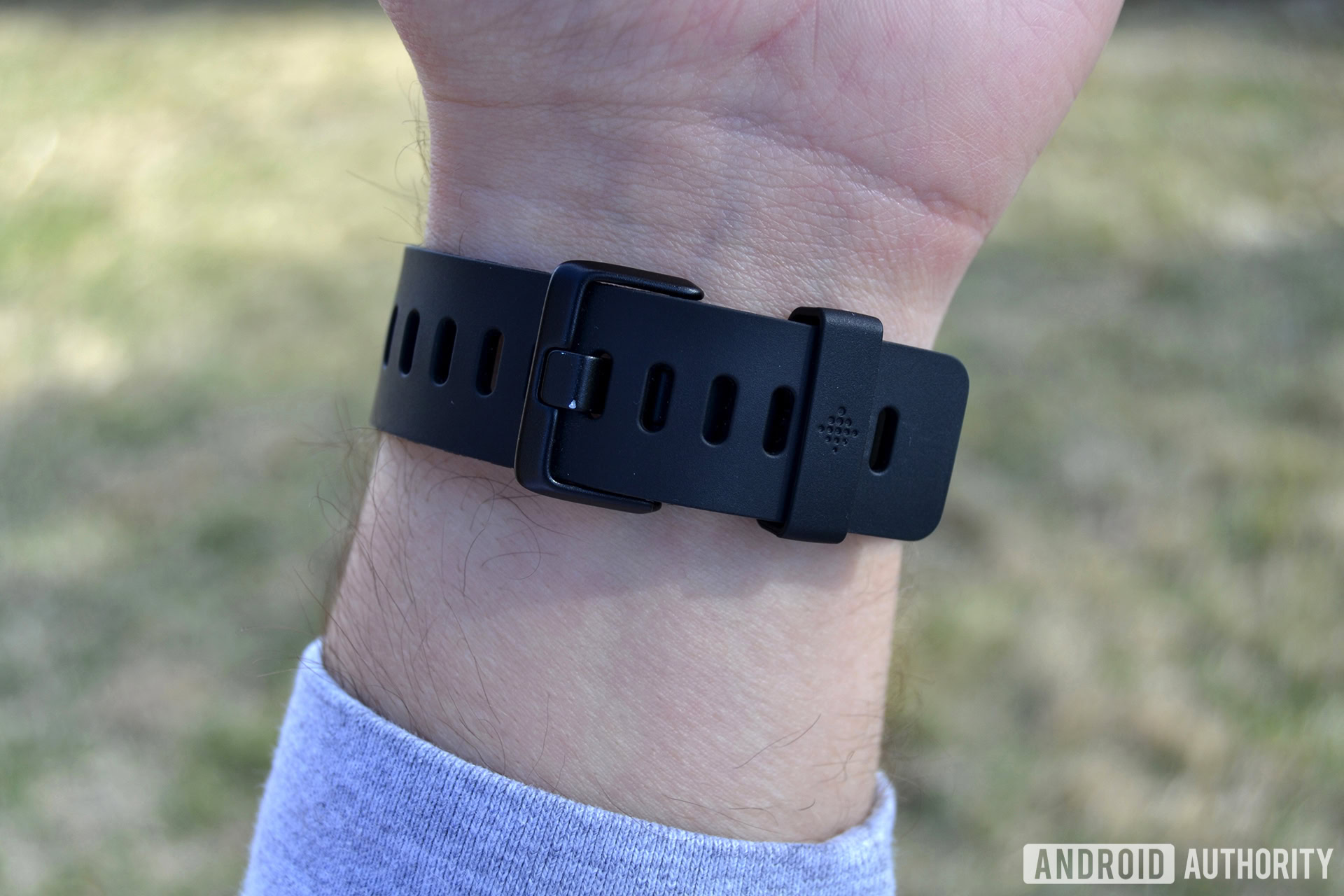
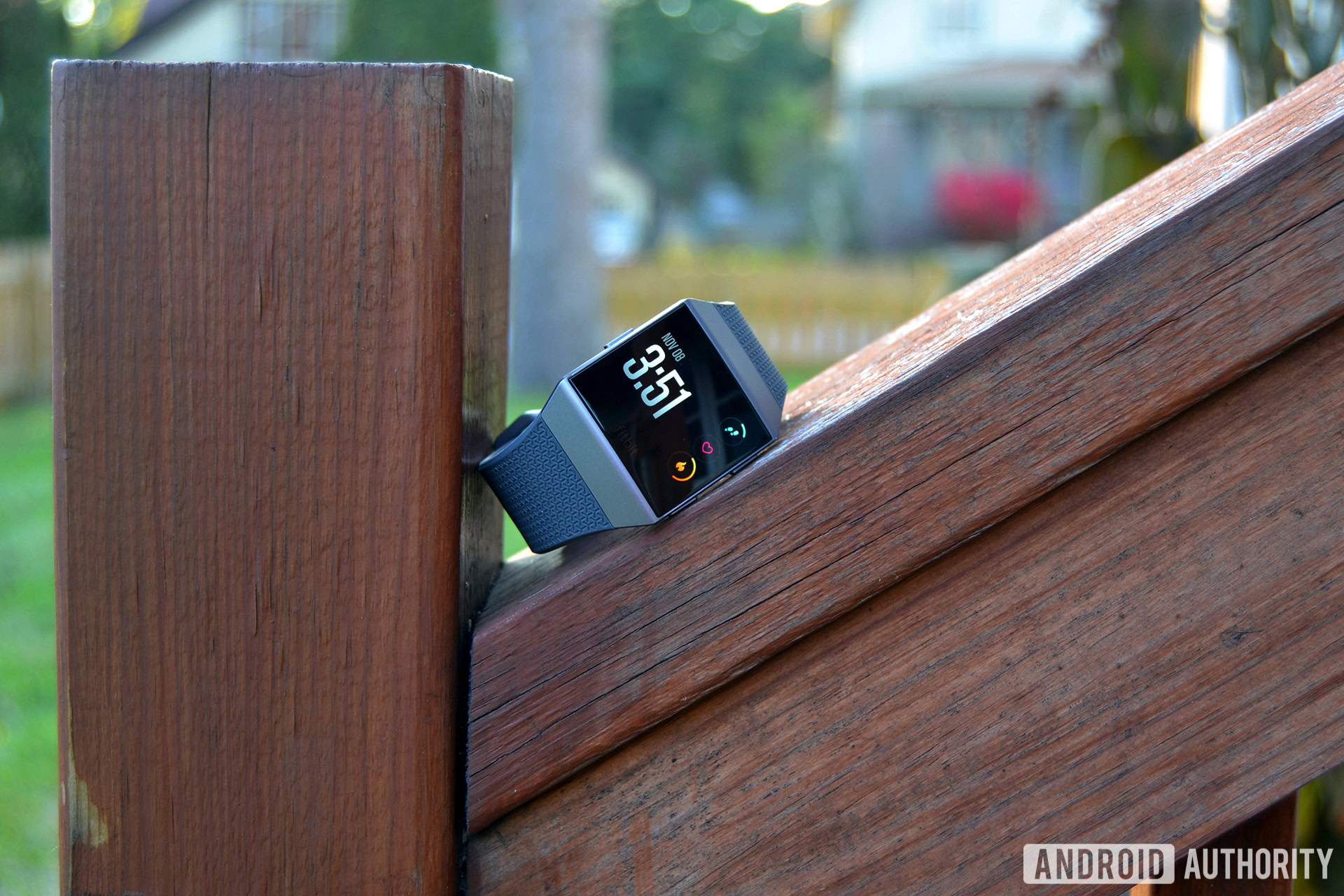
If you aren’t so much a fan of the design, you can customize it with a variety watch straps which range from different colored classic watch bands, to Horween leather, to metal mesh bands. The metal ones are a bit pricey, but I think the $50 leather bands are a great way to make the watch look nicer.
One small gripe: swapping out watch bands is unnecessarily difficult. You need to insert each band at a 45-degree angle, which can be frustrating when you’re also trying to hold down the spring pin.
On the front is a square 1.34-inch touchscreen LCD display. It has a 300 x 300 resolution resulting in a pixel density of 316ppi (higher than the Ionic’s). It uses an ambient light sensor to automatically adjust brightness for different lighting conditions. So far, we’ve had no issues seeing the display outdoors in direct sunlight.
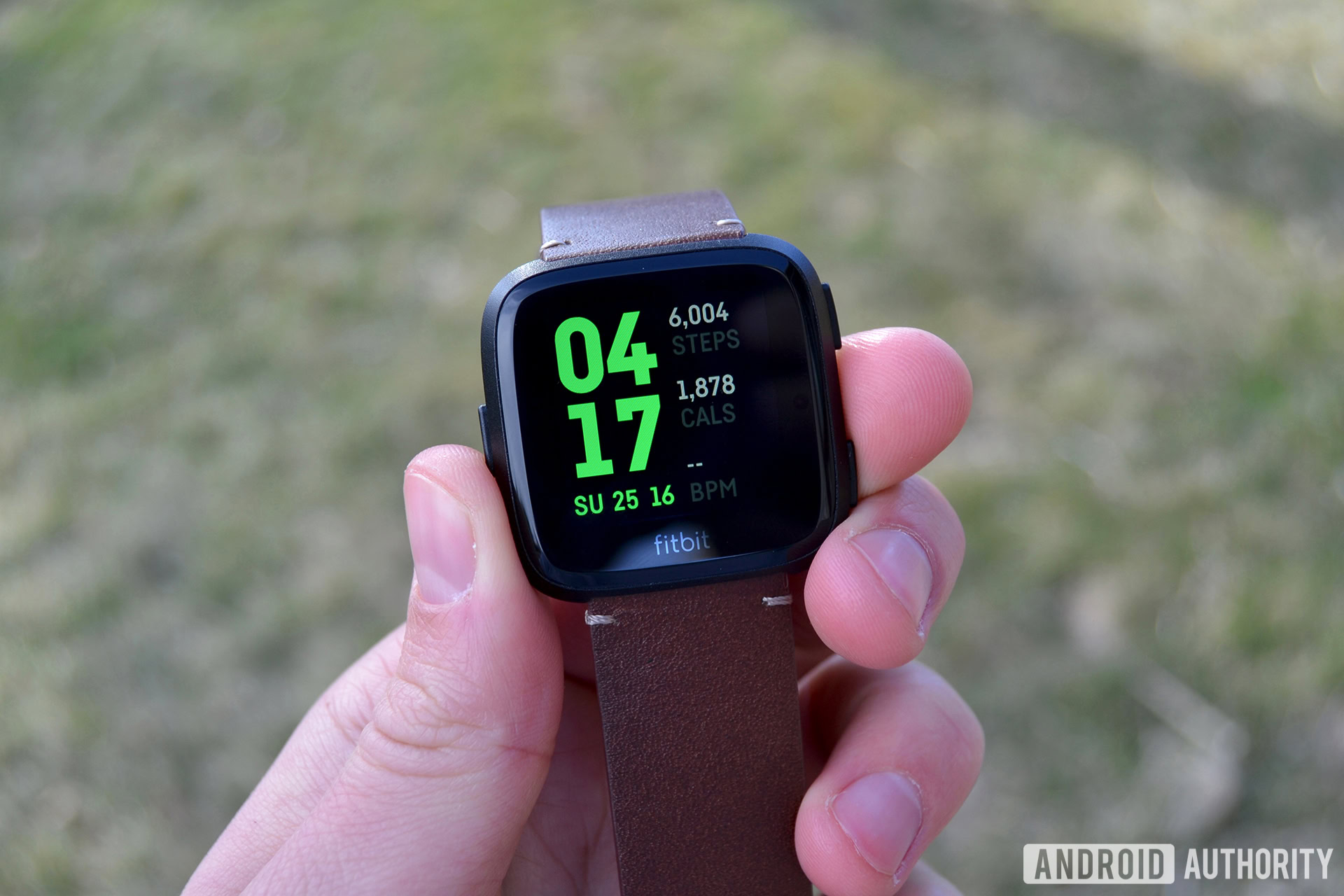
Another little design touch worth noting is that the heart rate sensor around back is flush with the casing, so the watch won’t make any red marks or indentations on your wrist if you wear it for a long time. That casing also has a 5ATM water resistance rating, meaning you can wear it in the shower or go swimming with it.

Smartwatch features
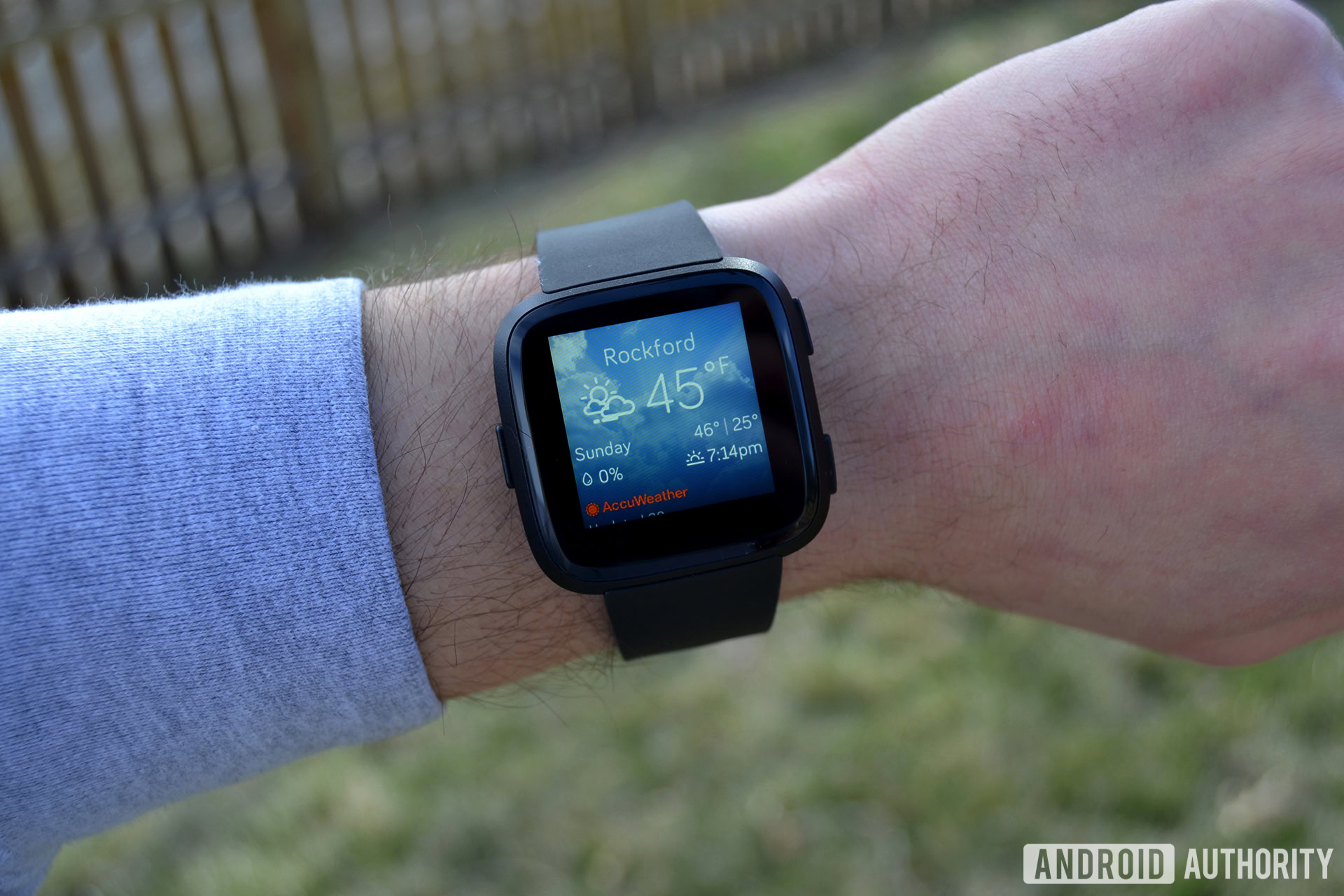
The Versa’s software is a big improvement over what we first experienced on the Ionic, and that’s all thanks to the company’s new-and-improved Fitbit OS 2.0. Almost all the lag we experienced on the Ionic is gone, and the user interface is now much more intuitive. Little tweaks like swiping down from the watch face to access your notifications make the software feel more polished (the Ionic made you swipe up from the bottom for some reason).
Fitbit OS 2.0 is a huge improvement, but still has its quirks.
Fitness-minded users will also appreciate the new Fitbit Today feature, which allows you to access your daily and weekly health and fitness stats, historical activity, and recent exercises from your wrist. Previously, you’d need to open the Fitbit app to view a lot of this data.
Note: Fitbit rolled out Fitbit OS 3.0 to the Versa and Ionic in December 2018. The update brings more detailed sleep and exercise stats to the on-device Dashboard, as well as heart rate and hourly activity stats. You can also now log water and food intake from the watch. Finally, the update brings goal-based exercises, which first debuted on the Fitbit Charge 3. Head here to read more about Fitbit OS 3.0.
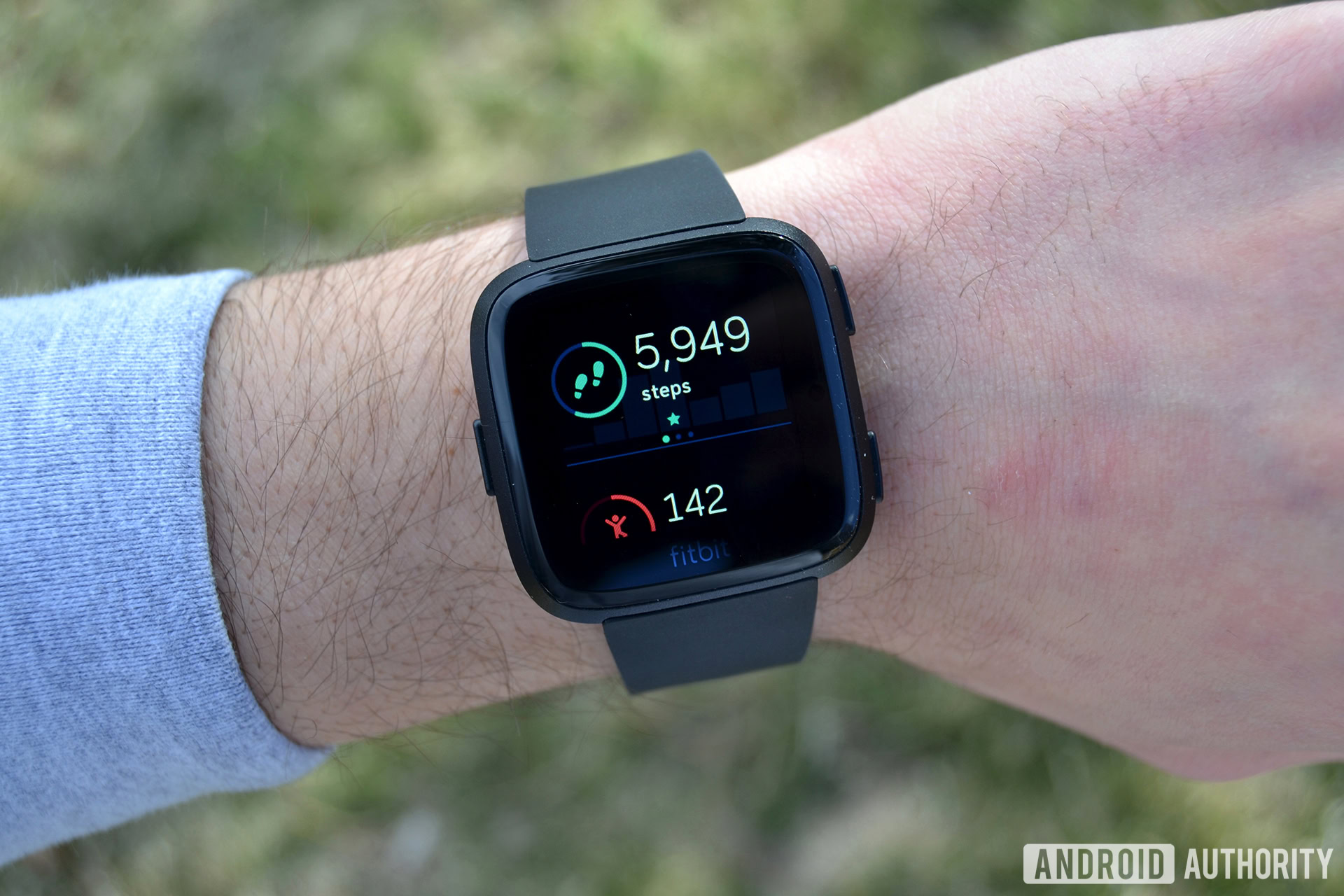
The Fitbit Versa received an update in May 2018 that introduced the company’s helpful female health tracking feature. Female health tracking is a way for women to track their menstrual cycle, record symptoms, and compare trends over time directly in the Fitbit app. Fitbit’s proprietary algorithm gets smarter and more accurate as you log your period. All of this information will also be available right on your wrist.
You can access even more granular details in the Fitbit app, which has educational content on ovulation, fertility, and more, and even connect with other women for support and advice.
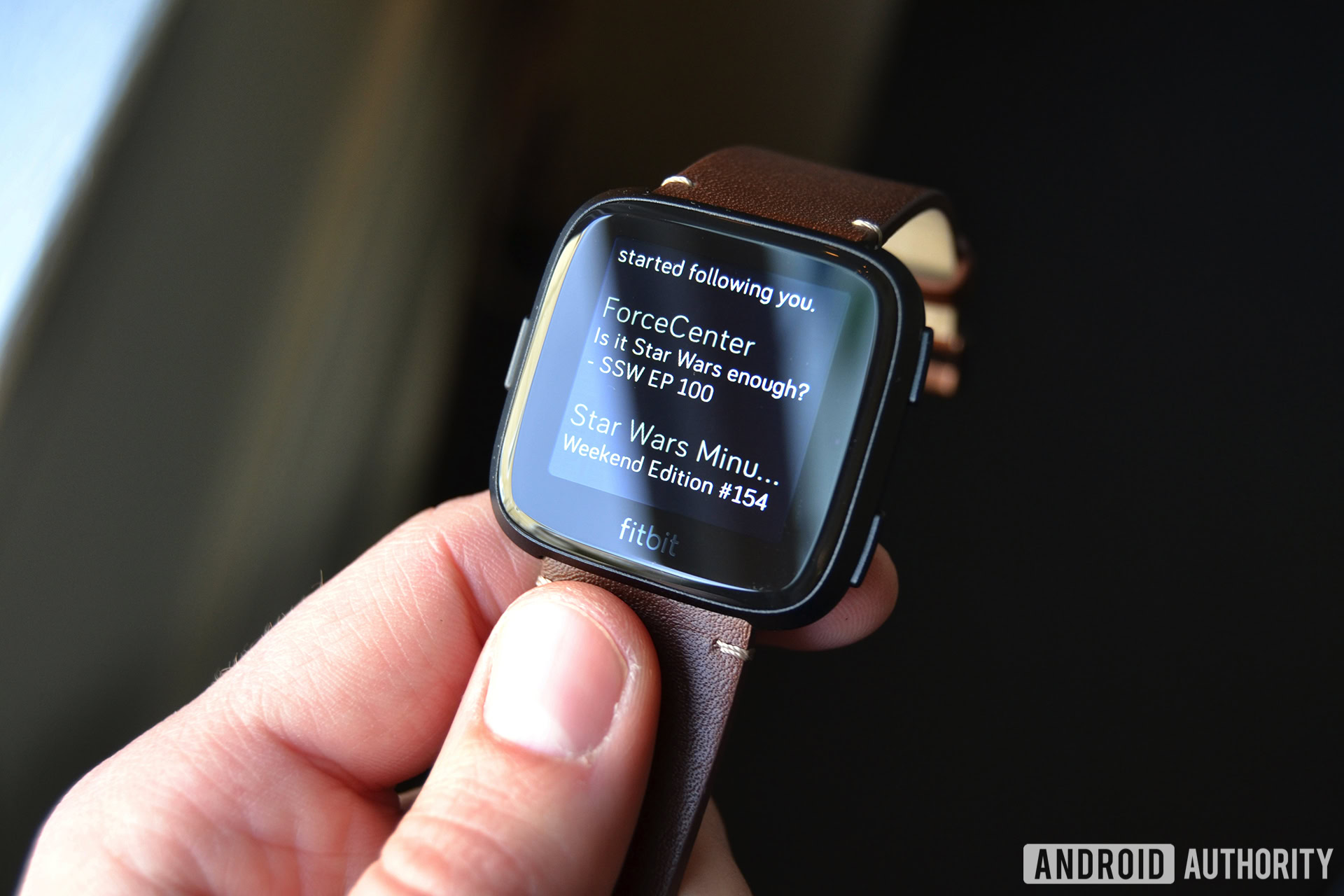
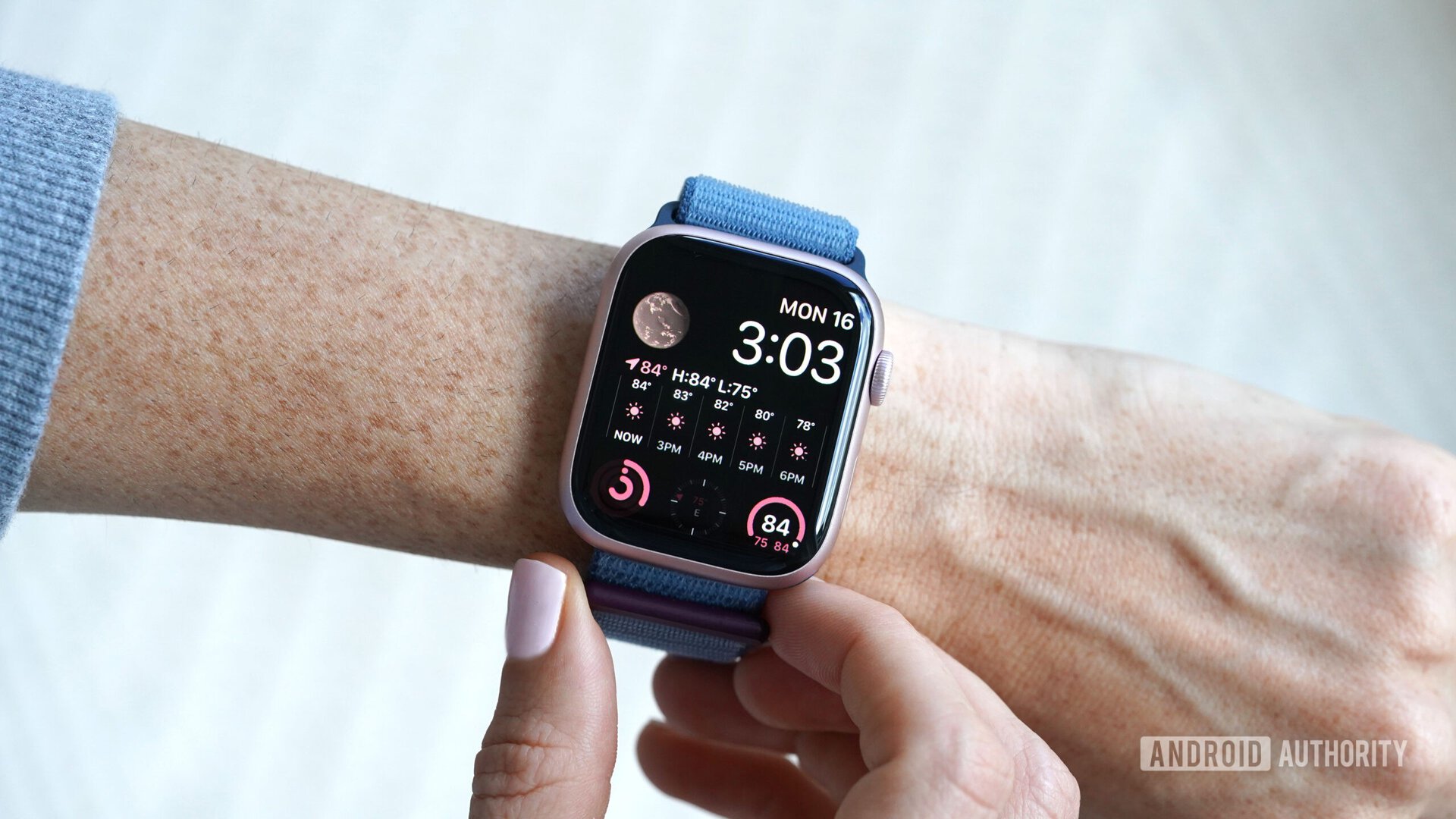
Fitbit rolled out an update in May 2018 that lets users reply to smartphone notifications from their watches. You can reply to just about any message from the Versa using pre-populated responses, and for many apps you can utilize Google’s Smart Replies to respond to messages as well. This makes the Versa a much more compelling smartwatch than it was at launch.
If you’re an iPhone user, you’re out of luck. You’ll still get notifications, but the quick reply feature isn’t going to support iOS any time soon. Fitbit says it’s trying to work with Apple to enable this feature, but I wouldn’t hold your breath — Apple is a stickler when it comes to these things.
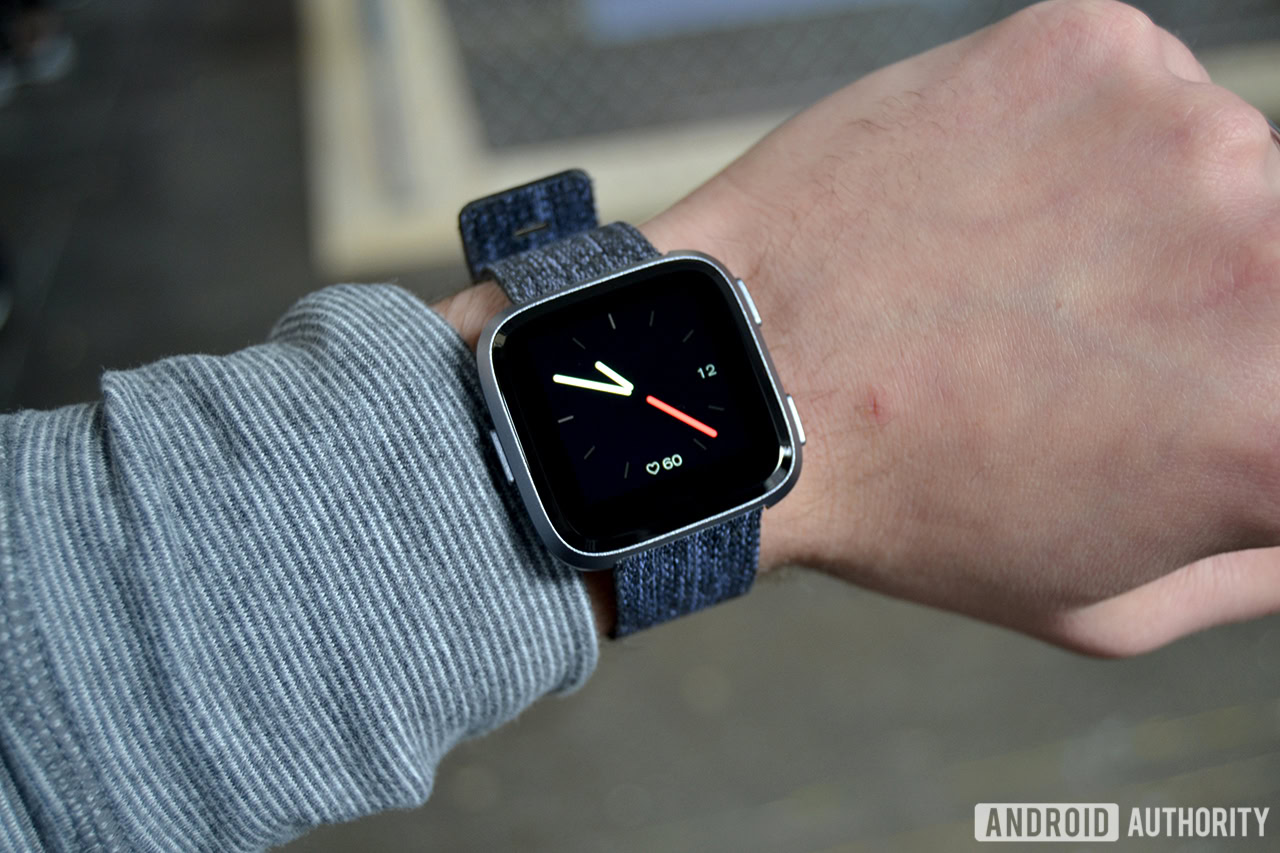
The Versa lacks contactless payment support on the regular model in the U.S.. For some reason, the pricier special edition Versa in the States has support for Fitbit Pay, but the $200 regular model doesn’t. That’s only in the U.S. though — in all other parts of the world, both models support Fitbit Pay. This is a weird choice on Fitbit’s part, and it seems like nothing more than a cash grab.
Fitbit Pay is only on the special edition model in the U.S., and that seems like a cash grab.
We were told Fitbit Pay works just like it does on the Ionic, which means the experience will be super convenient — especially when you’re out on a run. If you need to stop for a quick drink at the store, having a watch with contactless payment support means you don’t need to carry around a wallet to buy something. That’s super handy.
Fitbit Pay isn’t available on nearly as many banks as Google Pay, Samsung Pay, or Apple Pay though. That’s something you’ll want to keep in mind before spending extra on the special edition model.
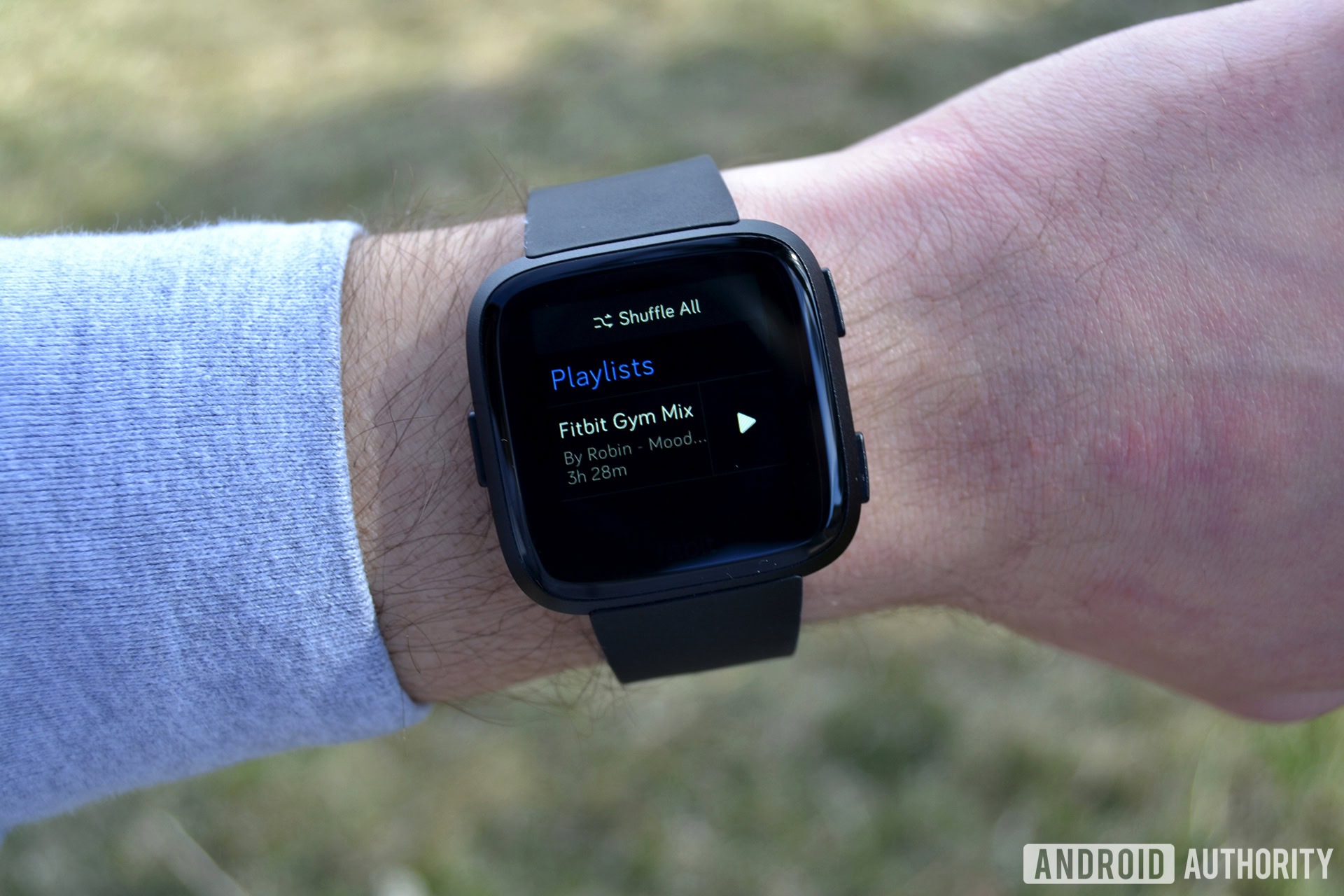
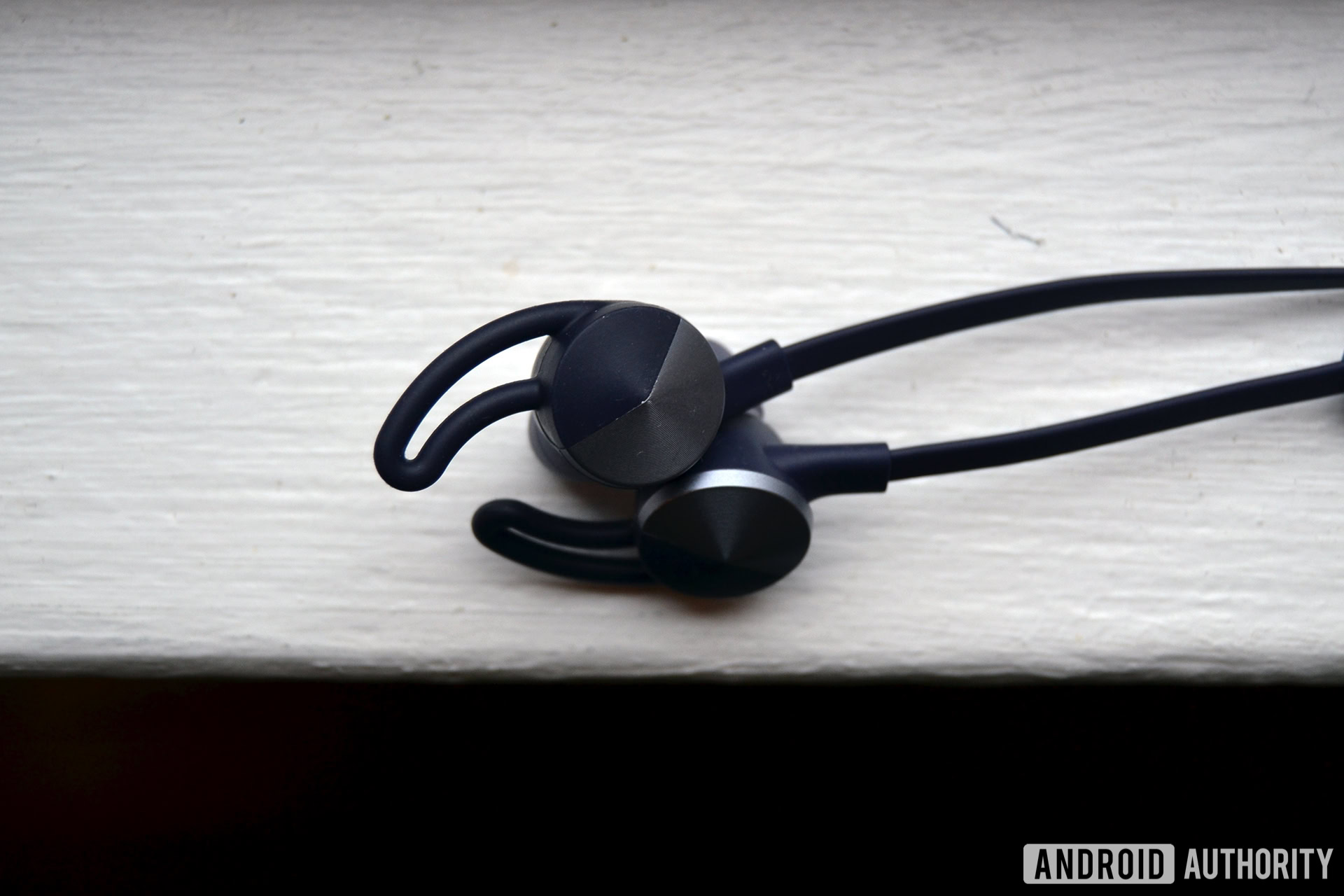
No matter which model you choose, you’ll have 2.5GB of available space on board for music storage. You can load up around 300 of your favorite songs, listen to stations from Pandora, and now listen to playlists on Deezer. Music needs to be side-loaded from a computer though (unless you just want the pre-made playlists from Deezer or Pandora), and the syncing process is slow as molasses. The Fitbit Connect app for desktop is also pretty buggy. Personally, I’d rather skip the process altogether and use my phone for music — even if that means bringing it along on a run.
The number of apps available in Fitbit’s app store is growing, but still lacking. You aren’t able to navigate anywhere with maps or summon a voice assistant to perform a specific action.
On December 3, 2019, Fitbit rolled out Fitbit OS version 4.1 to the original Versa. This brought with it the ability to keep five watch faces on the Versa at one time, an on-device sleep score, and much more.
This isn't the smartest watch out there.
Despite its improvements, Fitbit OS is still clearly in its early stages. It’s quirky and limited compared to other smartwatches. On the positive side, Fitbit has proved it’s focused on improving its software, and doing so in a timely manner.
Fitness and health tracking
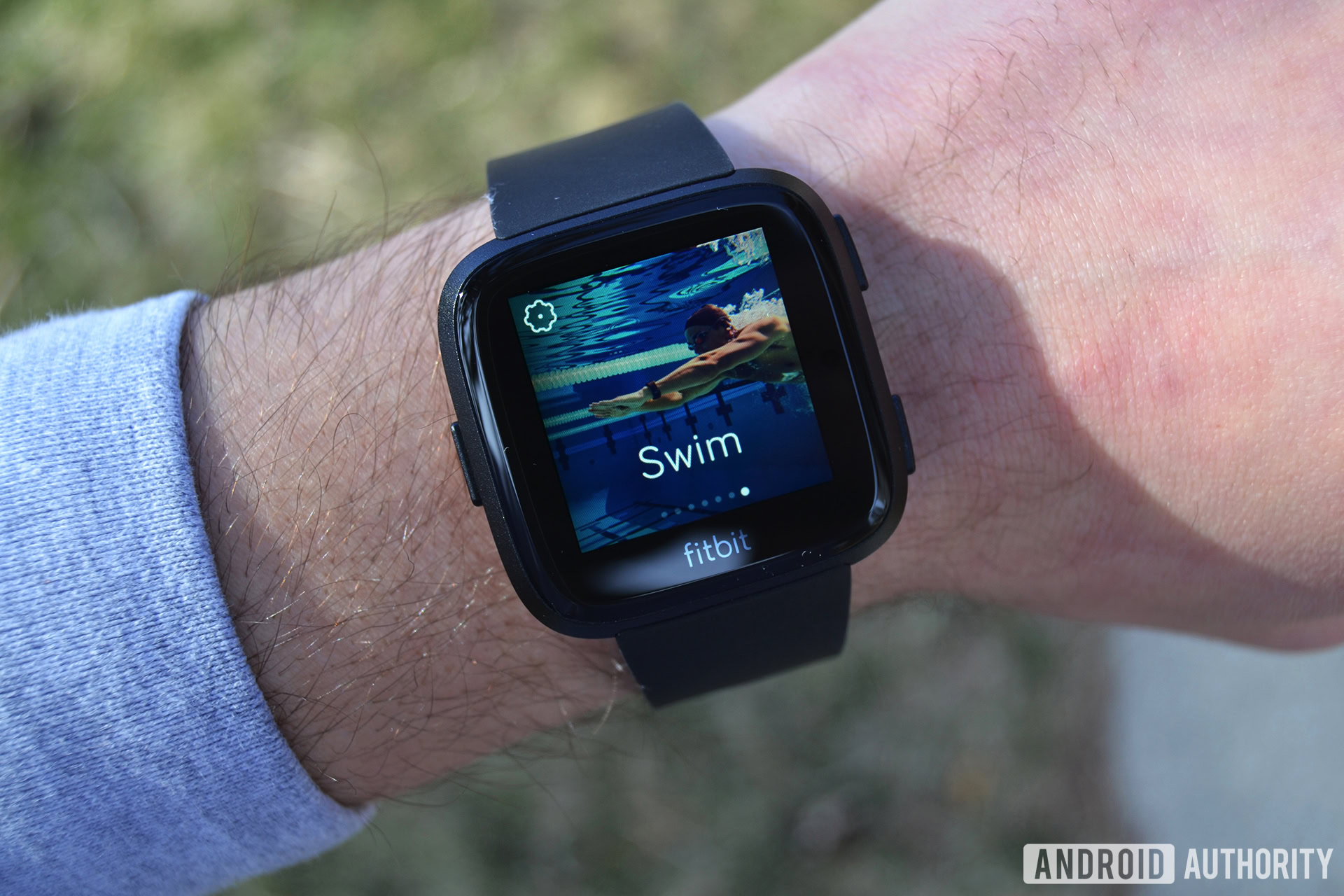
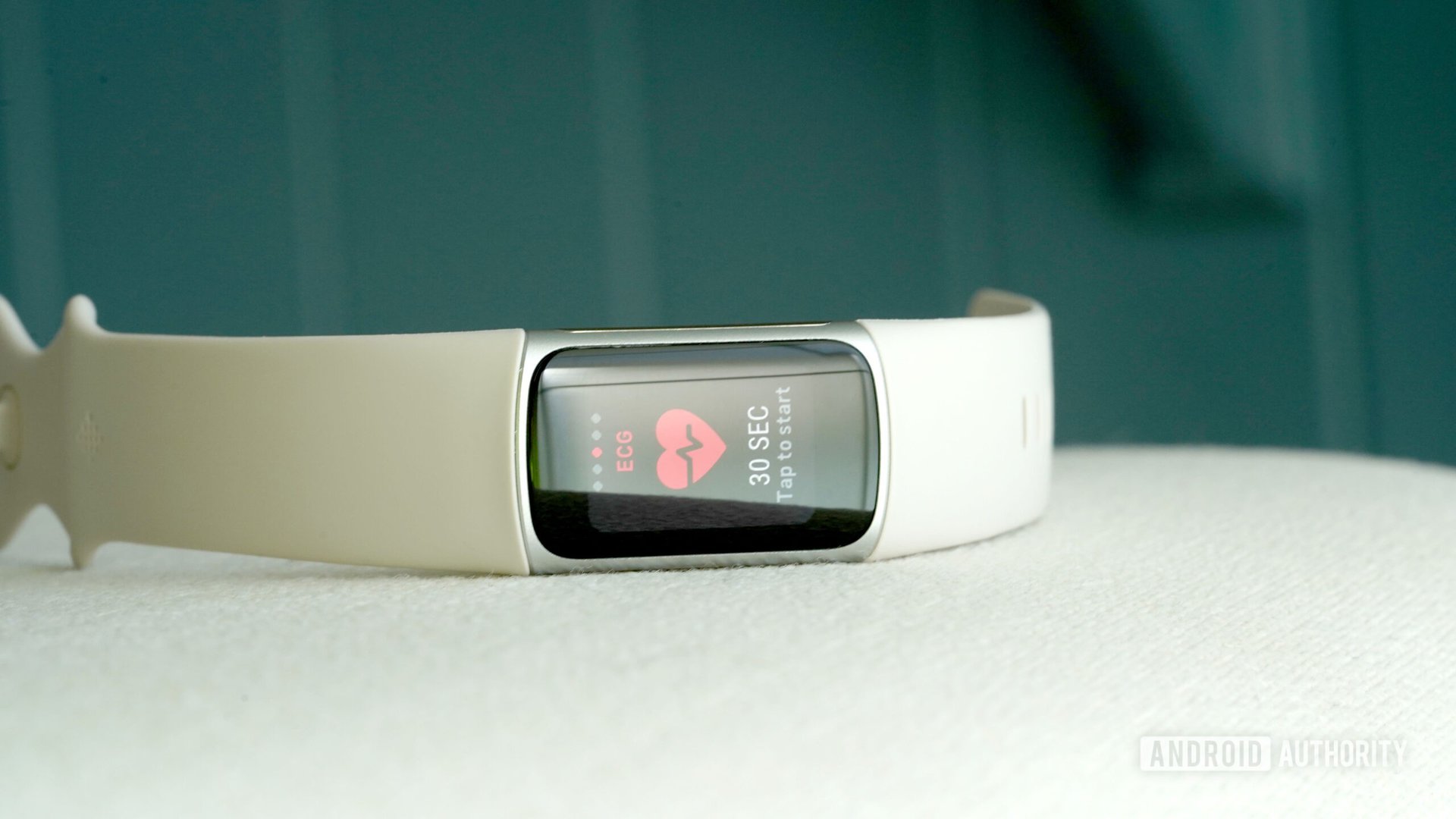
The Versa makes up for all its quirks with its fitness and health tracking prowess. It’s not the most feature-packed device, but it excels at the basics.
It can track your steps taken, calories burned, heart rate, active minutes, distance traveled (through Connected GPS), and your sleep. In terms of step, calorie, and active minutes tracking, the Versa is just as accurate as most other fitness trackers out there.
The Versa is a great fitness tracker at its core.
There’s no onboard GPS here, so the watch won’t give you the most accurate distance metrics. It can use your phone’s GPS when it’s nearby, but that still means you’ll need to carry your phone with you on a run to get accurate pace, distance, and speed metrics. The Ionic has GPS built in, but you’ll have to pay about $70 more for it.
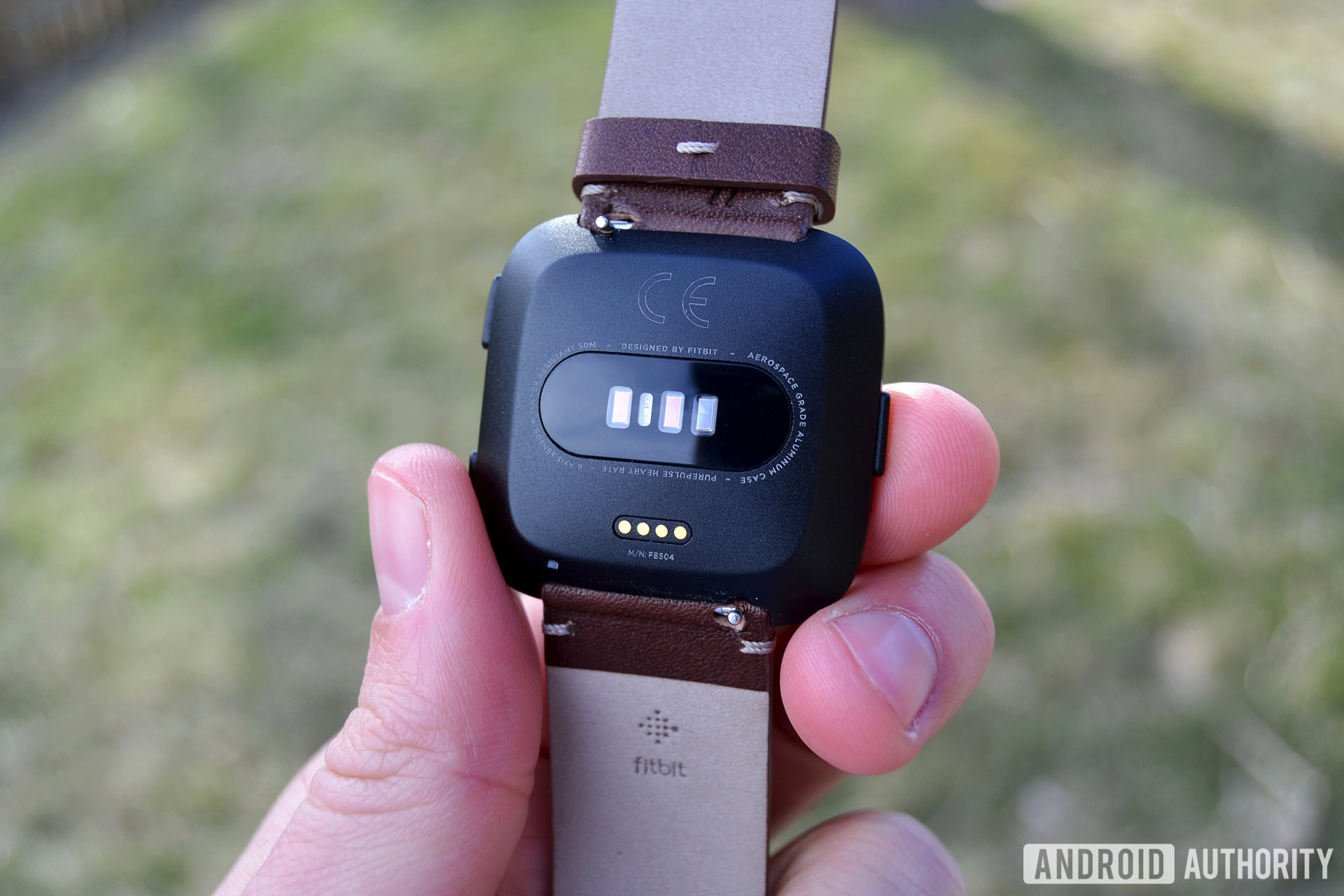
Fitbit’s PurePulse heart rate monitor makes a return, which will track your resting and active heart rate throughout the day. It’s mostly accurate during workouts, but this is a wrist-based sensor and won’t pick up every little change as well as a chest strap could.
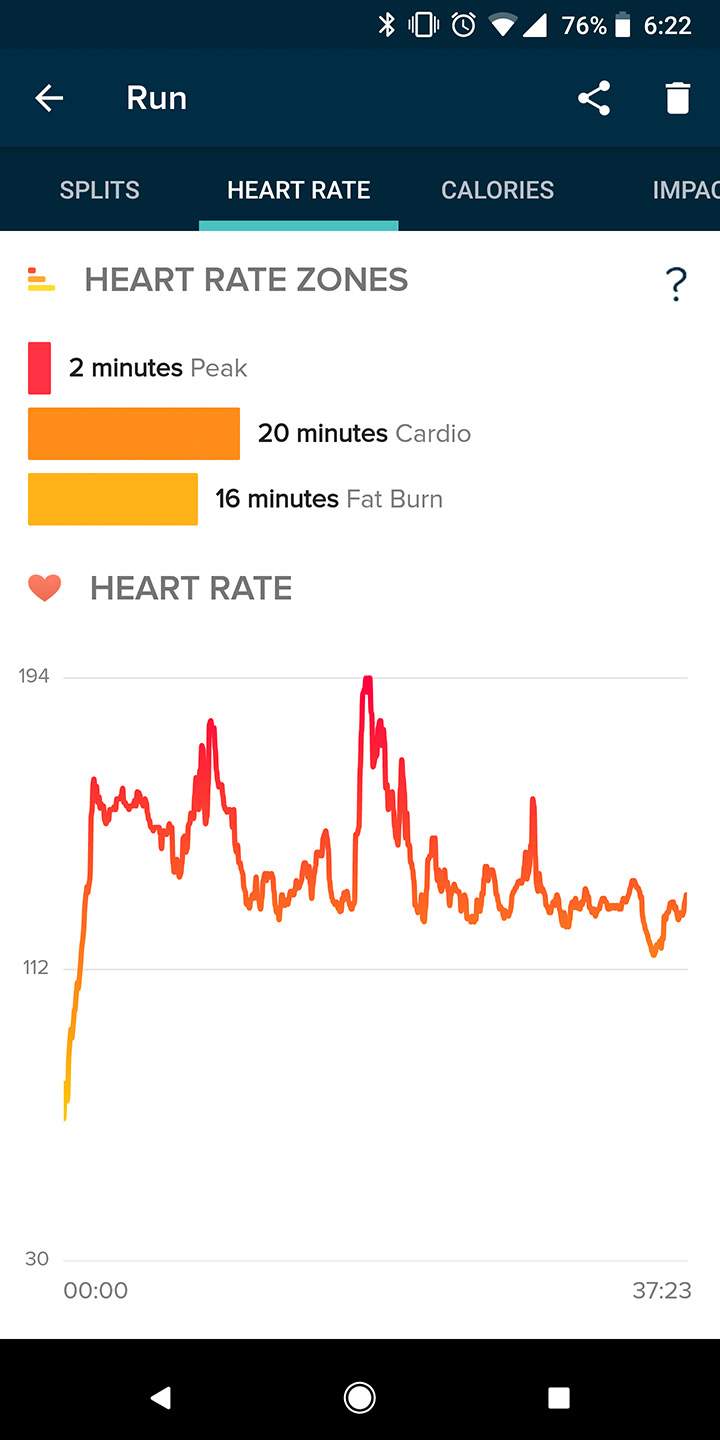
I took a run with my trusty Polar H10 chest strap, the Garmin fenix 5, and the Fitbit Versa. The H10 recorded my max heart rate of 175bpm at around the 26-minute mark, and the fenix 5 was able to hit that mark too. The Versa only picked up a heart rate of around 154bpm at that point.
Obviously we’re looking for spot-on numbers here, but it’s okay if they’re not completely accurate. Wrist-based heart rate monitors are good tools to help you better keep track of your heart rate throughout the day and during workouts, but they shouldn’t be relied upon to give you accurate numbers at all times.
That heart rate data will help the Versa measure your Cardio Fitness Level — which should help you better understand your fitness level compared to other people your age and gender. This is basically an estimate of your VO2 Max, or your cardiovascular fitness level. The Cardio Fitness Score is based on your resting heart rate and user profile, so Fitbit uses a lot of your health data to give you a more precise score. The more you wear your Fitbit, the more accurate this number will be.
This section of the app isn’t just a sea of numbers you need to try to make sense of; it also gives you recommendations on how you can improve your score over time. Losing a bit of weight and exercising more frequently can help raise your score (at least that’s the case for me).
More reviews: Fitbit Charge 3 review | Fitbit Versa Lite review
The Versa can keep track of running, biking, treadmill walking or running, weight training, interval workouts, and swimming. Everything else can be recorded in the general “workout” sport profile. During a run, the watch will track your pace, average pace, distance, total time, steps, calories, and heart rate. You can get most of this information in all the other sport profiles too, plus your number of lengths when you’re swimming. Fitbit still hasn’t implemented a rep counting feature in the weights mode, but that’s okay — it doesn’t seem like any company has figured out an accurate way to count reps yet.
For those of us who need a little bit of coaching from time to time, the Versa has a feature called Fitbit Coach. This is a series of device-guided workouts that will help you exercise no matter where you are. Out of the box, the Versa comes with three workouts: 10 Minute Abs, 7 Minute Workout, and Warm It Up. You can access more by downloading the Fitbit Coach app. There’s even a paid premium option if you want access to Fitbit’s entire catalogue of workouts.
I really like the Fitbit Coach. It’s improved a lot since the FitStar days on the Fitbit Blaze, and it’s a unique, fun way to motivate yourself when you don’t feel like exercising. Not everyone is going to use this feature, but you should at least give it a shot.
With the Versa, Fitbit continues to be the leader in sleep tracking.
Fitbit continues to be a leader in sleep tracking for a few reasons. It not only collects all the data you’d expect of a fitness tracker, but it displays that data in an easy-to-understand way. You can easily see what sleep stages you were in during the night, a 30-day average of your sleep stats, and how your sleep compares to other people of the same age and gender.
Sleep tracking is only going to get better over time, too. The Versa, like the Ionic, has a built-in relative SpO2 sensor which isn’t being utilized yet. Fitbit wants to eventually use this sensor to detect sleep apnea, but that’s just something the company is exploring for now.
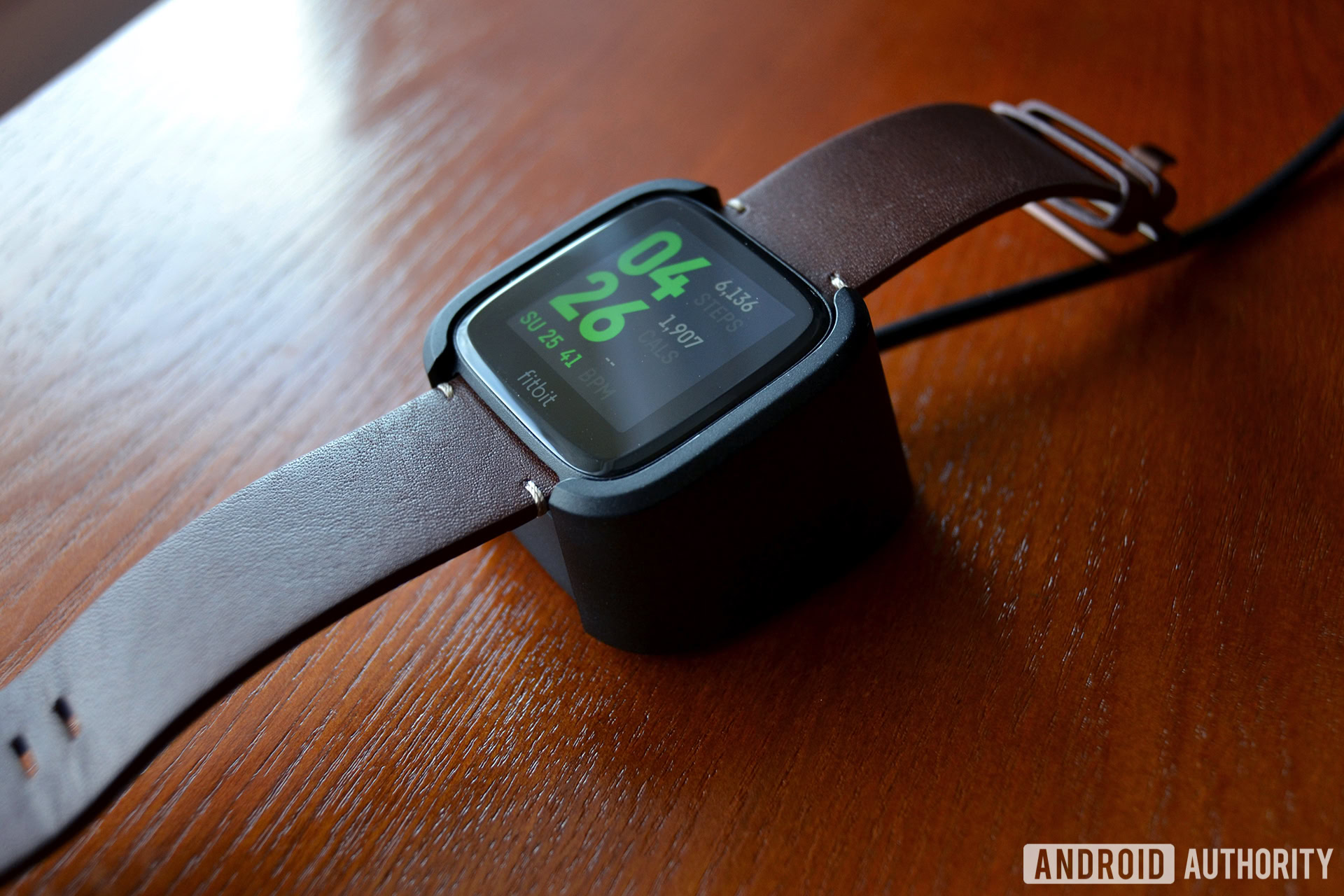
The Versa trounces the smartwatch competition in battery life. Fitbit OS is a light operating system overall, enabling the Versa to last upwards of four days on a single charge — and that’s with activity tracking included.
Another bonus: Fitbit is now including a sturdy, dock-like charger with the Versa. Just pinch the sides of the charger, place the watch inside, and make sure the connection pins are lined up. It’s way easier to connect than the Ionic’s terrible magnetic charger.
| Fitbit Versa, Versa Lite, and Versa Special Edition | |
|---|---|
Display | 1.34-inch touchscreen LCD 300 x 300 resolution ~316ppi 1:1 aspect ratio 1,000-nit maximum brightness Corning Gorilla Glass 3 |
Battery | Smartwatch mode: 4+ days 145mAh Lithium-polymer battery |
Memory | 4GB (2.5GB available for music storage) (excluded on Lite) Saves seven days of motion data, saves daily totals for the past 30 days |
Materials | Case and buckle: aluminum Strap: flexible, durable material similar to that used in many sports watches |
Sensors and components | 3-axis accelerometer 3-axis gyroscope (excluded on Lite) Optical heart rate monitor Altimeter (excluded on Lite) Ambient light sensor Vibration motor Wi-Fi antenna (802.11 b/g/n) (excluded on Lite) Connected GPS NFC (special edition only in the U.S.) |
Water resistance | 5ATM |
Notifications | Call, text, calendar, email, music control, and much more |
Compatibility | Android, iOS, & Windows |
Dimensions | Case dimensions: 39.36 x 37.65 x 11.2mm Small: 140-180mm Large: 180-220mm |
Colors | Classic: black band with black aluminum case, peach band with rose gold aluminum case, gray band with silver aluminum case Special edition: charcoal woven band with graphite aluminum case, lavender woven band with rose gold aluminum case Lite: white/silver aluminum, lilac/silver aluminum, marina blue/marina blue aluminum, mulberry/mulberry aluminum |
The Fitbit app
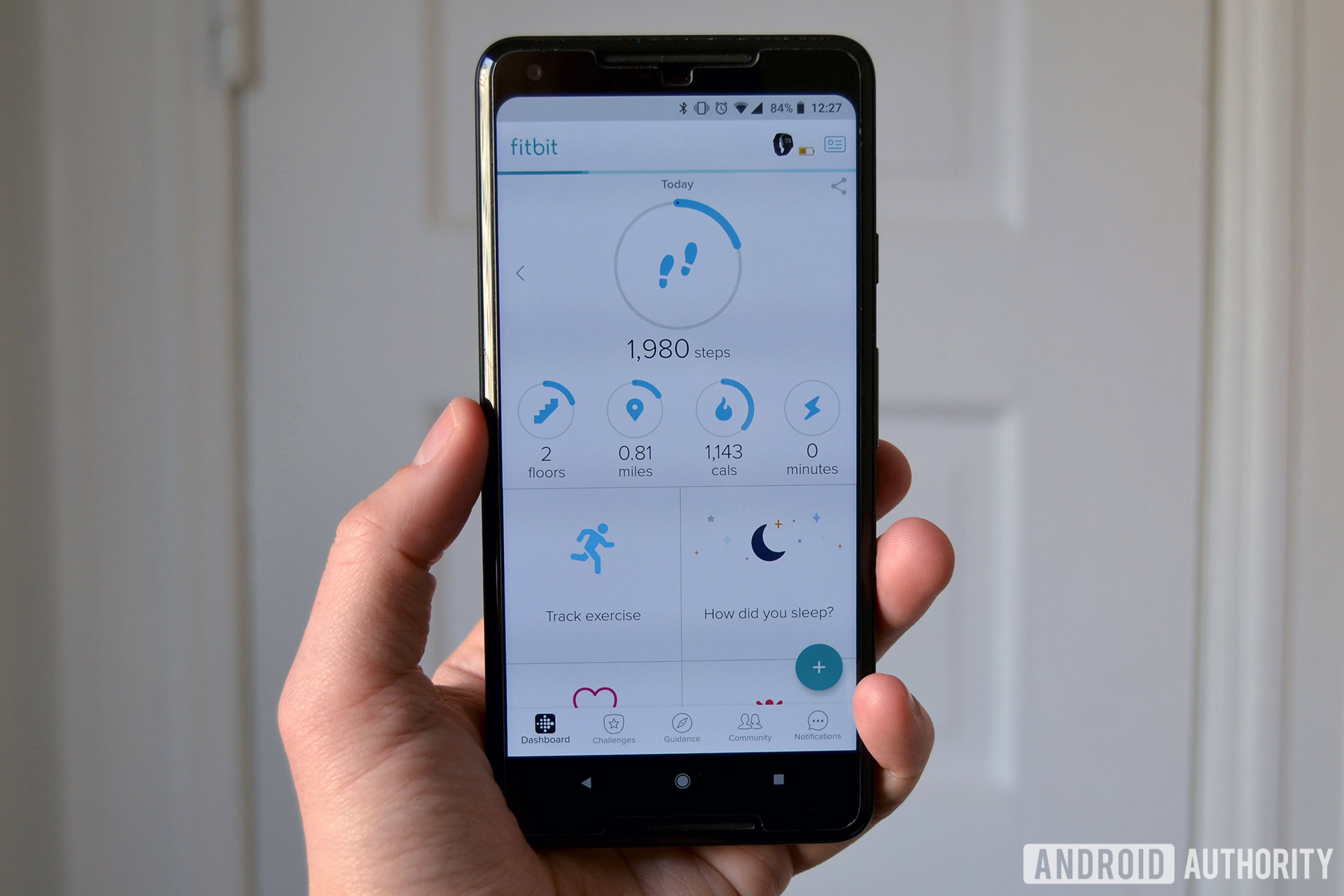
The Fitbit app is one of the more easy-to-use fitness apps out there.
All your need-to-know information can be found on dashboard (the main screen), where you’ll find your step, calorie, and active minutes stats for the day, as well as sleep, heart rate, and more. Clicking on any one of these sections will give you more information on that particular metric.
This is one of the most social fitness apps we’ve used. It lets you connect with other Fitbit owners and join in on conversations with people in the community. You can become a member of a particular dieting or exercise group and chat with like-minded users about, well, anything you’d like. All of these conversations take place in the community tab.
The community is one of the most powerful aspects of the Fitbit ecosystem.
The challenges section of the app will push you to go that extra mile, while the guidance tab is where you’ll find Fitbit Coach.
The best thing about using the Fitbit app is that it’s compatible with dozens of other third-party services like MyFitnessPal, MapMyRun, Lose It!, Weight Watchers, Endomondo, and more. If you’re invested in one of those ecosystems and don’t want to give it up for Fitbit, you don’t have to — all your Fitbit data will sync and you can continue using your favorite apps.
Gallery
Should you buy it?
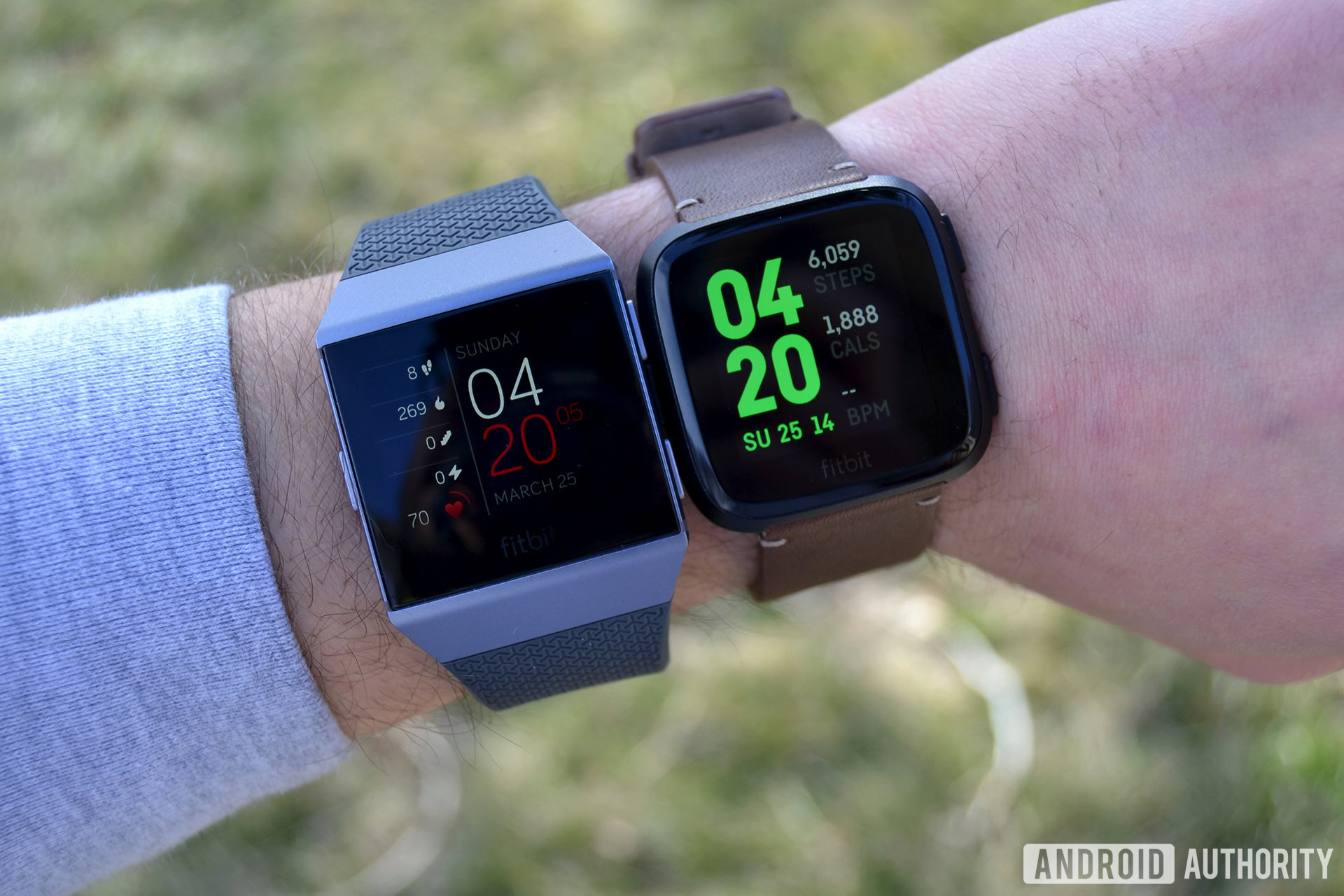
The base model Versa will run you $150, while the special edition version goes for $170. That higher price tag will get you Fitbit Pay support in the U.S. and a really nice woven band in either charcoal or lavender colors. You can get it now through Amazon and Fitbit.com.
At that price, the Fitbit Versa undercuts the first-gen Apple Watch by about $50, and it’s on the low end of the price spectrum compared to most other Wear OS devices.
So that’s it for our Fitbit Versa review. Now there’s just one question left: should you buy it? That depends.
If you need a smartwatch that doesn’t die after just one day, buy the Versa. If you’re a fan of the Fitbit ecosystem and don’t want to pay $270 for the Ionic (and you’re okay with not having a GPS), buy the Versa. If you need a stellar fitness tracker, buy the Versa. If you need a good smartwatch, we can finally say you should buy the Versa.
Fitbit is going to be a major player in the smartwatch world, but it's just not there yet.
When the Versa first launched in 2018, it needed some work on the software side. It has since received numerous software updates bringing quick replies, new dashboard features, female health tracking, and much more to the smartwatch. It’s still not as robust as Wear OS or the Apple Watch, but for under $200, the Fitbit Versa is a stellar smartwatch.
Fitbit Versa in the news: